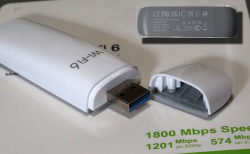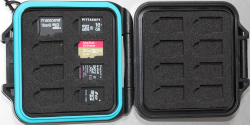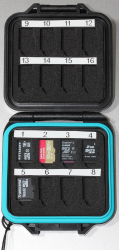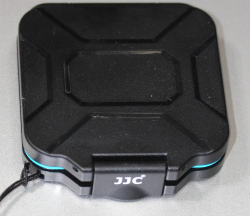Wifi-6 USB on a Linux - BrosTrend AX1
Thursday, August 29. 2024
My previous post was about 10+ year old laptops. At that time Broadcom ruled the chipset Wifi chipset market.
Since those days balance has shifted. Today, most common chipset for Wifi is Realtek. I also have couple Mediatek Wi-Fi chips working perfectly with Linux. To repeat what I said previously: These guys have their Linux support via open-source drivers. Broadcom doesn't. Hm. I dunno, maybe that's what made them decline and the other guy thrive? Most certainly, I wish it was their open-source support. 😁
So, my old laptop lost wireless connectivity and I needed SOMETHING to get the thing going to The Internet. I happened to have a brand new USB-stick on a test drive. As there aren't many Linux-supported chipsets, most USB-sticks won't work with 802.11ax / Wi-Fi 6 and you have to settle for slower speeds combined with less security. This product is supposed to beat competition on that.
Spoiler: I doesn't! (yet)
The product is BrosTrend AX1. The speed rating is AX1800 and it's supposed to be WiFi 6 Linux Compatible WiFi Adapter:

lsusb information:
Bus 001 Device 013: ID 0bda:b832 Realtek Semiconductor Corp. 802.11ac WLAN Adapter
Device Descriptor:
bLength 18
bDescriptorType 1
bcdUSB 2.00
bDeviceClass 0 [unknown]
bDeviceSubClass 0 [unknown]
bDeviceProtocol 0
bMaxPacketSize0 64
idVendor 0x0bda Realtek Semiconductor Corp.
idProduct 0xb832 802.11ac WLAN Adapter
bcdDevice 0.00
iManufacturer 1 Realtek
iProduct 2 802.11ac WLAN Adapter
Btw. See how USB-identification is for 802.11ac. Confusing, that.
At this point, there is no pre-baked Linux kernel module. You can build one in a jiffy. Source code is at https://github.com/morrownr/rtl8852bu. Getting that C-code to work in your favor, after git clone, you need to run ./install-driver.sh. This script does a lot for you. At end, the script even stealthily copies the kernel module into proper directory to make loading the driver very easy. This is confusing and not all module builds do the install without asking.
When I modprobe 8852bu on Fedora 40, module does little bit of whining, but comes up. For the crash I sent some information to author: https://github.com/morrownr/rtl8852bu/issues/38
On my laptop, connection to 802.11ac / Wi-Fi 5 works ok. I suspect, there is something off with WPA3 as connections to 802.11ax / Wi-Fi 6 simply keep asking for network password in a forever loop. But hey! It worked. I got to The Net and was able to fix things. The thought of 802.11ax support is left unanswered. If USB-information doesn't state 802.11ax either, does the stick really support it or not? I dunno.
I'm hoping, WPA3-issue would be fixed one day, so that I'd be able to join any network of my choosing, not the one the device is capable of going.
Update - 20th January 2025: There is an updated driver with full 802.11ax -support in Linux.
Broadcom Wi-Fi in a Linux - Fedora 40 case
Tuesday, August 27. 2024
Is that combo really impossible?
I've been running Linux in multiple old/oldish laptops. Broadcom is such a popular chip vendor, it is the most typical choice regardless of the laptop manufacturer. As Broadcom is full of idiots, their device drivers are proprietary. In their infinte wisdom, they pre-build Linux binaries and hand them out. This, obviously, is much better than not having the closed-source driver package at all. However, they really don't care. Every once in a while something happens in Linux kernel and their driver becomes less-than-operational.
Also, by lack of one official source, there are number of packages made out of the binary distribution. Key naming convention will include letters W and L in them, so you as an end user have to know wl stands for Broadcom BCM4311, BCM4312, BCM4313, BCM4321, BCM4322, BCM43224, BCM43225, BCM43227, BCM43228, BCM43142, BCM4331, BCM4352, BCM4360 devices. Simple! (No, not simple)
As an example: Fedora doesn't support Broadcom at all (as default), Arch Linux has packages brcm80211, b43 and broadcom-wl, Debian has broadcom-wl as non-free package.
Recently my Fedora 40 refused to find a working Wifi. It all started on from 6.9.10 up to 6.10.5. Oh, I forgot to mention, altough Fedora doesn't have the support, there exist number of alternative RPM-repos for Fedora carrying Broadcom. An example, RPM Fusion., non-free package of broadcom-wl. To make this mess even messier, RPM Fusion also has kmod-wl and akmod-wl.
Ok, many packages, back to the problem: my laptop lost Wifi and I really struggled to figure out why, which kernel module caused the problem and for what reason. At the time both broadcom-wl and kmod-wl were installed.
This is VERY confusing! You have to be super-smart to understand much of my less-than-coherent story above. Unfortunately, that is the reality. Everything gets convoluted, confusing and chaos.
In RPM Fusion Bugzilla, there is a bug #6991 Kernel hangs due to broadcom wifi driver. This bug report is specifically for akmod-wl, which was not installed in my laptop. Using an USB-dongle, uninstalling both broadcom-wl and kmod-wl, followed by installing akmod-wl did not solve the problem either. Unlike with original packages, with akmod-wl there was no kernel crash on modprobe. With this package NetworkManager didn't work either. Weird.
When I wrote comments to bug report and Mr. Vieville, author of akmod-wl, replied with a suggestion. There existed an unreleased version of 6.30.223.271-53. Little bit of dnf installing and testing ... it works! Now my laptop had native Wifi-connectivity and I could un-plug the USB-dongle.
This incident left me really confused and happy.
Completed: Gray Zone Warfare
Wednesday, August 21. 2024
I love gaming. I've played all kinds of video games nearly my entire life.
Recently, I've been playing Gray Zone Warfare.

After 200+ hours, final mission is finally completed!
The last mission is brutal. The mission is to go to three worst possible places, locate and bring back mission items in each. To make things even more difficult, you don't simply sneak in/out, there is a minimum kill count that has to be completed at the worst possible locations. Brutal!
This immensly difficult and realistic game is a Escape from Tarkov -clone. In this game there are three factions of PMC and the idea is not to "escape". Your faction's home base is safe, base cannot be raided by other players. According to game studio, the idea is geared towards co-op, leave base to complete a mission -style rather than player vs. player. Both game modes exist. You absolutely can play a lone wolf game too, but given the punishing nature of this game where a single shot by enemy can kill you on the spot, having more eyes to spot enemies and more firepower to kill enemies makes avoiding death so much easier.
One last noteworthy thing is: There's going to be ~6 month cycle in the game. Everything will be wiped clean. All players are back to level 1 with not much gear in their lockers. At the time of writing, first (public) wipe is about to happen soon. That way those experienced players who have been playing this early-access game as it was made publicly available @ Steam won't necessarily benefit against newer players.
I cannot wait for the next version! We'll get day/night cycle and more missions and ... oh yes!
SD Case - Storing the cards
Wednesday, August 14. 2024
Few years ago I got interested in hieroglyphs ... erhm. SD-card markings. My piece about them is here.
Now that we have established the fact that I have too many SD-cards, where do I store them? Well. I didn't. They where around equipment, desk and shelves all around the clutter. There was a point in time, I decided to do something about it.
This is my recent storage solution:

This type of case isn't available easily. It took me a while to hunt down such an item from a Chinese on-line shop. I wanted one with enough capacity for the future. Also, I wanted one that won't break or get lost easily.
This one meets the spec. Also, I went further and pimped it with appropriate labels:

There is a tiny piece of paper to translate the numbers into real-life meanings. It's simply omitted from the pic.
Now I know where my RasPi OS-images and photos are. No need to go finding the cards anymore!



